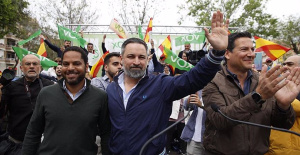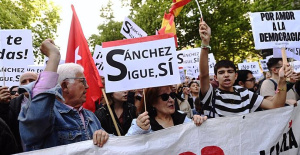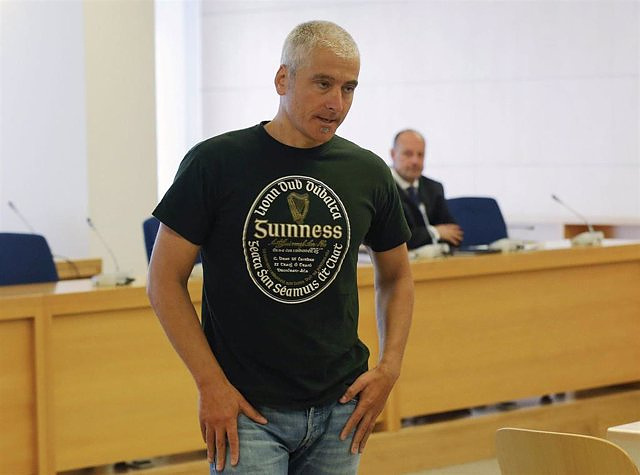The Memorial Center collects in its annual balance that five ETA members returned voluntarily when their legal claims were prescribed
MADRID, 15 Ago. (EUROPA PRESS) -
The documentation known as the 'ETA stamps' that France handed over to the Spanish authorities in 2018 has so far served as the evidentiary basis for eight convictions in the National Court, on four occasions thanks to the analysis of the Civil Guard and as many other cases. for the work of the specialists of the National Police.
This is stated in the 'Balance of terrorism in Spain 2022' published in the July Notebooks of the Memorial Center for the Victims of Terrorism, consulted by Europa Press, which reviews the work of the Spanish Security Forces after the end of the attacks , especially about the unsolved murders.
In this sense, the balance stops at the evidentiary basis of the 'ETA stamps' delivered by France in 2018 with documentation intervened to ETA since 1999. The destination of the material was the Memorial Center itself, although the transfer was made by virtue of a rogatory letter with legal guarantees to preserve its value before the courts.
The Minister of the Interior, Fernando Grande-Marlaska, highlights in the prologue to the balance that the security forces and the justice system continue to work to "establish the criminal responsibilities that could correspond to ETA leaders", and recalls that in 2022 nine were convicted for this reason.
The Memorial Center, directed by Florencio Domínguez, reviews the cases in which the 'ETA stamps' have contributed to obtaining convictions, beginning with the murder of the prison official Máximo Casado in the year 2000.
Specifically, a self-critical letter or 'kantada' by ETA member Iñigo Guridi Lasa intervened in France "contributed decisively" to the condemnation of the members of the 'Totto commando' Asier Arzalluz Goñi, Aitor Aguirrebarrena Beldarrain and Iñigo Guridi, as material authors , 33 years in prison, as well as Javier García Gaztelu, 'Txapote', as inducer.
The second sentence affects the historic ETA leader Soledad Iparraguirre, 'Anboto', as the author of a crime against the Crown and deposit of weapons of war. The key was a document seized in Salies-de-Béarn (France) that proved her link to the ETA leadership.
The 'ETA stamps' allowed Iñigo Gudiri to be sentenced again, to 51 years in prison, for the attack against a civil guard in Navarra in 2000, while in the case of José Carlos Apeztegia, a letter from him proposing carry out attacks against prison officers.
The fifth sentence is related to the attack against the Palace of Justice of Gijón and a pharmacy in 1996. As a result of a self-criticism written in 2011 by Iratxe Sorzabal, this member of ETA was sentenced to 24 years and six months as the author of two crimes of terrorist havoc.
Another 'kantada' led to the sentence of Juan Luis Rubenach Roig to more than a thousand years for the car bomb attack against a person in charge of the Scientific Police in 2001. For his part, Asier Eceiza Ayerra was sentenced to 19 years as an accomplice of the attack against the socialist councilor Juan Priede, again thanks to the self-critical writings of other terrorists.
The eighth and last sentence is that of the lawyer Arantza Zulueta, in this case thanks to the intelligence analysis of documents seized in the French country that allowed her to be sentenced to four years for a crime of integration into a terrorist organization, as well as for depositing weapons and explosives to another three years and six months.
The balance of the Memorial Center also reviews other aspects after the end of ETA such as the three zulos that were intervened in 2022, one of them in France, or the voluntary return of five who fled from Justice after spending many years outside the reach of the courts Spanish people.
This is Nekane Txapartegi, who returned from Switzerland a week after the 15-year legal claim for falsification of an official document was rendered null and void, being released after appearing at the National Court awaiting trial.
By expiring his accusation as a member of the 'Nafarroa commando', Lázaro Galarza Larrayoz returned from Mexico, ending the search and capture order that had been issued against him since 1992. He then returned to the Central American country, where he died of an accident at work.
Emilio Martínez de Marigorta and Félix Manzanos Martínez, with "a dense history of terrorist activities in the 1970s and 1980s", also returned to Spain, in their case from Cape Verde. They arrived here from Algeria in 1989 and stayed for more than 30 years, when the local authorities refused to hand them over.
Iñaki Rodríguez Muñoa arrived in Cape Verde in 1986, who returned to Spain last year. This member of the political-military branch fled to Cuba by boat, where he had remained until his voluntary return.

 Exploring Cardano: Inner Workings and Advantages of this Cryptocurrency
Exploring Cardano: Inner Workings and Advantages of this Cryptocurrency Seville.- Economy.- Innova.- STSA inaugurates its new painting and sealing hangar in San Pablo, for 18 million
Seville.- Economy.- Innova.- STSA inaugurates its new painting and sealing hangar in San Pablo, for 18 million Innova.- More than 300 volunteers join the Andalucía Compromiso Digital network in one month to facilitate access to ICT
Innova.- More than 300 volunteers join the Andalucía Compromiso Digital network in one month to facilitate access to ICT Innova.-AMP.- Ayesa acquires 51% of Sadiel, which will create new technological engineering products and expand markets
Innova.-AMP.- Ayesa acquires 51% of Sadiel, which will create new technological engineering products and expand markets Unicaja lifts its first FIBA Champions League at the expense of Lenovo Tenerife
Unicaja lifts its first FIBA Champions League at the expense of Lenovo Tenerife Abascal (Vox) criticizes that Sánchez is "victimizing" himself and calls for elections after his possible resignation
Abascal (Vox) criticizes that Sánchez is "victimizing" himself and calls for elections after his possible resignation Carlos Alcaraz reaches the round of 16 in Madrid without breaking a sweat
Carlos Alcaraz reaches the round of 16 in Madrid without breaking a sweat Some 5,000 people demonstrate in front of Congress for democracy, hours before Sánchez's decision
Some 5,000 people demonstrate in front of Congress for democracy, hours before Sánchez's decision How Blockchain in being used to shape the future
How Blockchain in being used to shape the future Not just BTC and ETH: Here Are Some More Interesting Coins Worth Focusing on
Not just BTC and ETH: Here Are Some More Interesting Coins Worth Focusing on UPV students build a prototype of a wooden house to move to Equatorial Guinea
UPV students build a prototype of a wooden house to move to Equatorial Guinea The UA opens the call for the Impulso 2024 Awards for the best innovative business initiatives
The UA opens the call for the Impulso 2024 Awards for the best innovative business initiatives ALI, virtual assistant from Alicante, internationally recognized by the OECD
ALI, virtual assistant from Alicante, internationally recognized by the OECD Retrópolis brings the golden age of video games and computing to the UPV
Retrópolis brings the golden age of video games and computing to the UPV A million people demonstrate in France against Macron's pension reform
A million people demonstrate in France against Macron's pension reform Russia launches several missiles against "critical infrastructure" in the city of Zaporizhia
Russia launches several missiles against "critical infrastructure" in the city of Zaporizhia A "procession" remembers the dead of the Calabria shipwreck as bodies continue to wash up on the shore
A "procession" remembers the dead of the Calabria shipwreck as bodies continue to wash up on the shore Prison sentences handed down for three prominent Hong Kong pro-democracy activists
Prison sentences handed down for three prominent Hong Kong pro-democracy activists ETH continues to leave trading platforms, Ethereum balance on exchanges lowest in 3 years
ETH continues to leave trading platforms, Ethereum balance on exchanges lowest in 3 years Investors invest $450 million in Consensys, Ethereum incubator now valued at $7 billion
Investors invest $450 million in Consensys, Ethereum incubator now valued at $7 billion Alchemy Integrates Ethereum L2 Product Starknet to Enhance Web3 Scalability at a Price 100x Lower Than L1 Fees
Alchemy Integrates Ethereum L2 Product Starknet to Enhance Web3 Scalability at a Price 100x Lower Than L1 Fees Mining Report: Bitcoin's Electricity Consumption Declines by 25% in Q1 2022
Mining Report: Bitcoin's Electricity Consumption Declines by 25% in Q1 2022 Oil-to-Bitcoin Mining Firm Crusoe Energy Systems Raised $505 Million
Oil-to-Bitcoin Mining Firm Crusoe Energy Systems Raised $505 Million Microbt reveals the latest Bitcoin mining rigs -- Machines produce up to 126 TH/s with custom 5nm chip design
Microbt reveals the latest Bitcoin mining rigs -- Machines produce up to 126 TH/s with custom 5nm chip design Bitcoin's Mining Difficulty Hits a Lifetime High, With More Than 90% of BTC Supply Issued
Bitcoin's Mining Difficulty Hits a Lifetime High, With More Than 90% of BTC Supply Issued The Biggest Movers are Near, EOS, and RUNE during Friday's Selloff
The Biggest Movers are Near, EOS, and RUNE during Friday's Selloff Global Markets Spooked by a Hawkish Fed and Covid, Stocks and Crypto Gain After Musk Buys Twitter
Global Markets Spooked by a Hawkish Fed and Covid, Stocks and Crypto Gain After Musk Buys Twitter Bitso to offset carbon emissions from the Trading Platform's ERC20, ETH, and BTC Transactions
Bitso to offset carbon emissions from the Trading Platform's ERC20, ETH, and BTC Transactions Draftkings Announces 2022 College Hoops NFT Selection for March Madness
Draftkings Announces 2022 College Hoops NFT Selection for March Madness























